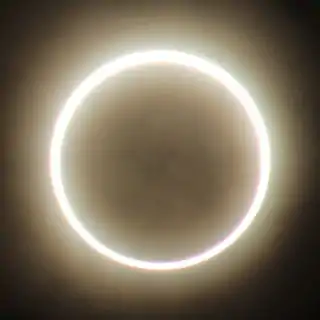Solar eclipse of February 17, 2026
An annular solar eclipse will occur on February 17, 2026. A solar eclipse occurs when the Moon passes between Earth and the Sun, thereby totally or partly obscuring the image of the Sun for a viewer on Earth. An annular solar eclipse occurs when the Moon's apparent diameter is smaller than the Sun's, blocking most of the Sun's light and causing the Sun to look like an annulus (ring). An annular eclipse appears as a partial eclipse over a region of the Earth thousands of kilometres wide.
| Solar eclipse of February 17, 2026 | |
|---|---|
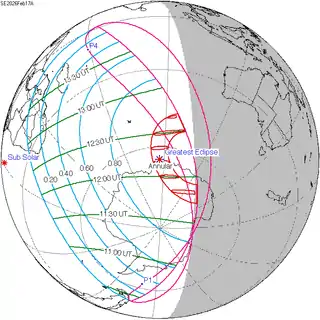 Map | |
| Type of eclipse | |
| Nature | Annular |
| Gamma | -0.9743 |
| Magnitude | 0.963 |
| Maximum eclipse | |
| Duration | 140 sec (2 m 20 s) |
| Coordinates | 64.7°S 86.8°E |
| Max. width of band | 616 km (383 mi) |
| Times (UTC) | |
| Greatest eclipse | 12:13:06 |
| References | |
| Saros | 121 (61 of 71) |
| Catalog # (SE5000) | 9565 |
Images
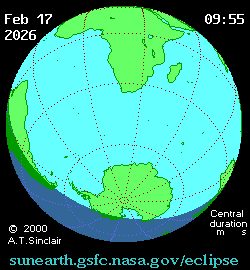
Animated path
Related eclipses
Solar eclipses 2026–2029
This eclipse is a member of a semester series. An eclipse in a semester series of solar eclipses repeats approximately every 177 days and 4 hours (a semester) at alternating nodes of the Moon's orbit.[1]
| Solar eclipse series sets from 2026–2029 | ||||||
|---|---|---|---|---|---|---|
| Ascending node | Descending node | |||||
| 121 | 2026 February 17 Annular |
126 | 2026 August 12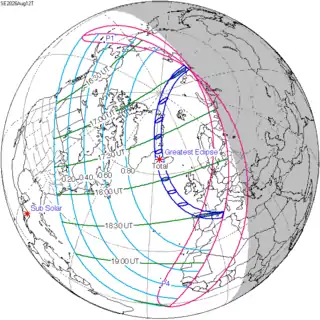 Total | |||
| 131 | 2027 February 6 Annular |
136 | 2027 August 2 Total | |||
| 141 | 2028 January 26 Annular |
146 | 2028 July 22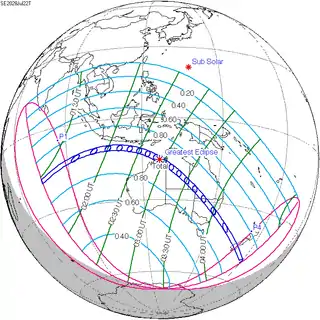 Total | |||
| 151 | 2029 January 14 Partial |
156 | 2029 July 11 Partial | |||
| Partial solar eclipses on June 12, 2029, and December 5, 2029, occur in the next lunar year eclipse set. | ||||||
Saros 121
Solar saros 121, repeating every about 18 years, 11 days, and 8 hours, contains 71 events. The series started with a partial solar eclipse on April 25, 944. It contains total eclipses from July 10, 1070, to October 9, 1809. It contains hybrid eclipses on October 20, 1827, and October 30, 1845. It contains annular eclipses from November 11, 1863, to February 28, 2044. The series ends at member 71 as a partial eclipse on June 7, 2206. The longest total eclipse occurred on June 21, 1629, with greatest duration of totality at 6 minutes and 20 seconds. The longest annular eclipse will occur on February 28, 2044, with greatest duration of annularity at 2 minutes and 27 seconds.[2]
| Series members 49–65 occur between 1801 and 2100: | ||
|---|---|---|
| 49 | 50 | 51 |
 October 9, 1809 |
 October 20, 1827 |
 October 30, 1845 |
| 52 | 53 | 54 |
 November 11, 1863 |
 November 21, 1881 |
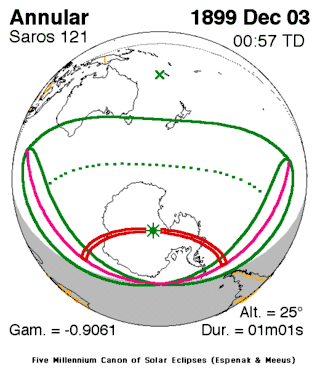 December 3, 1899 |
| 55 | 56 | 57 |
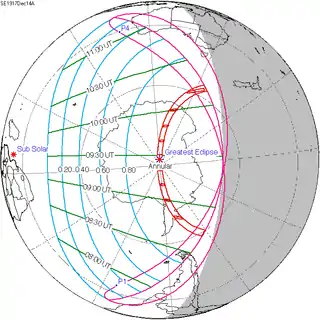 December 14, 1917 |
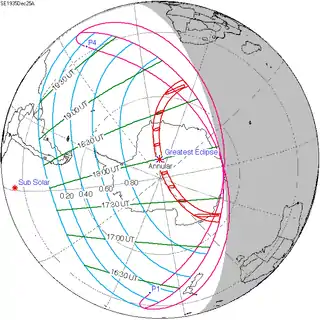 December 25, 1935 |
 January 5, 1954 |
| 58 | 59 | 60 |
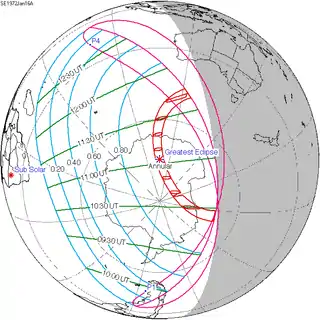 January 16, 1972 |
 January 26, 1990 |
 February 7, 2008 |
| 61 | 62 | 63 |
 February 17, 2026 |
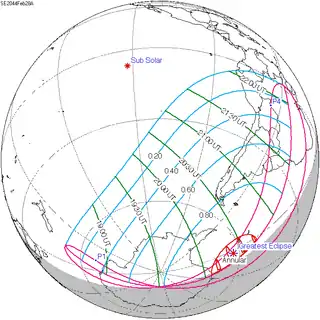 February 28, 2044 |
 March 11, 2062 |
| 64 | 65 | |
 March 21, 2080 |
 April 1, 2098 | |
Metonic series
The metonic series repeats eclipses every 19 years (6939.69 days), lasting about 5 cycles. Eclipses occur in nearly the same calendar date. In addition, the octon subseries repeats 1/5 of that or every 3.8 years (1387.94 days). All eclipses in this table occur at the Moon's ascending node.
| 21 eclipse events, progressing from south to north between July 13, 2018 and July 12, 2094 | ||||
|---|---|---|---|---|
| July 12–13 | April 30-May 1 | February 16–17 | December 5–6 | September 22–23 |
| 117 | 119 | 121 | 123 | 125 |
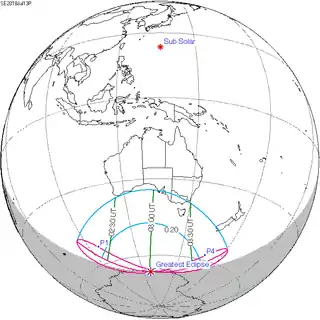 July 13, 2018 |
 April 30, 2022 |
 February 17, 2026 |
 December 5, 2029 |
 September 23, 2033 |
| 127 | 129 | 131 | 133 | 135 |
 July 13, 2037 |
 April 30, 2041 |
 February 16, 2045 |
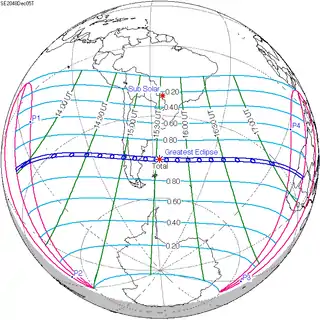 December 5, 2048 |
 September 22, 2052 |
| 137 | 139 | 141 | 143 | 145 |
 July 12, 2056 |
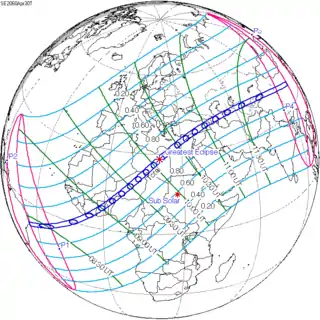 April 30, 2060 |
 February 17, 2064 |
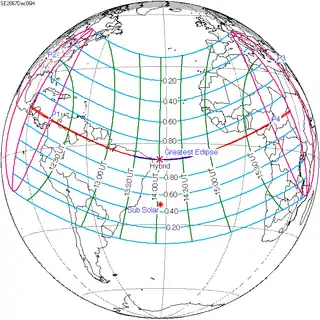 December 6, 2067 |
 September 23, 2071 |
| 147 | 149 | 151 | 153 | 155 |
 July 13, 2075 |
 May 1, 2079 |
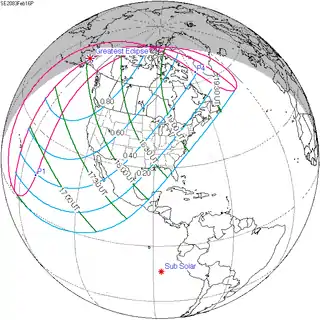 February 16, 2083 |
 December 6, 2086 |
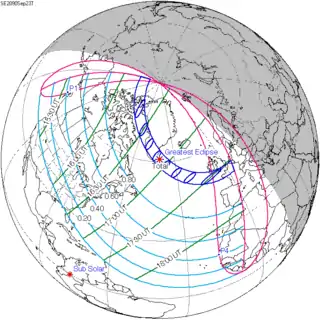 September 23, 2090 |
| 157 | ||||
 July 12, 2094 | ||||
References
- van Gent, R.H. "Solar- and Lunar-Eclipse Predictions from Antiquity to the Present". A Catalogue of Eclipse Cycles. Utrecht University. Retrieved 6 October 2018.
- Saros Series Catalog of Solar Eclipses NASA Eclipse Web Site.
.jpg.webp)
